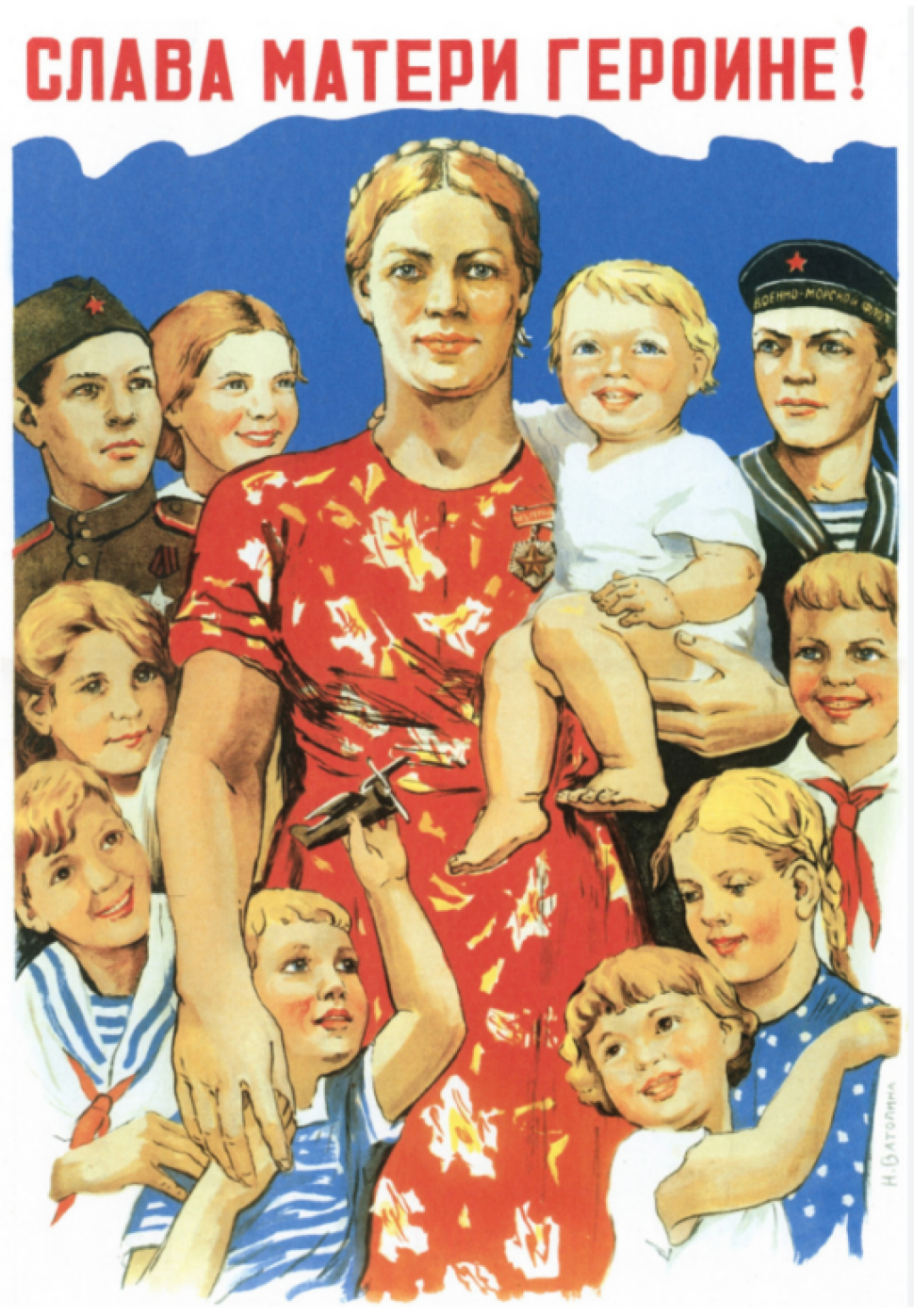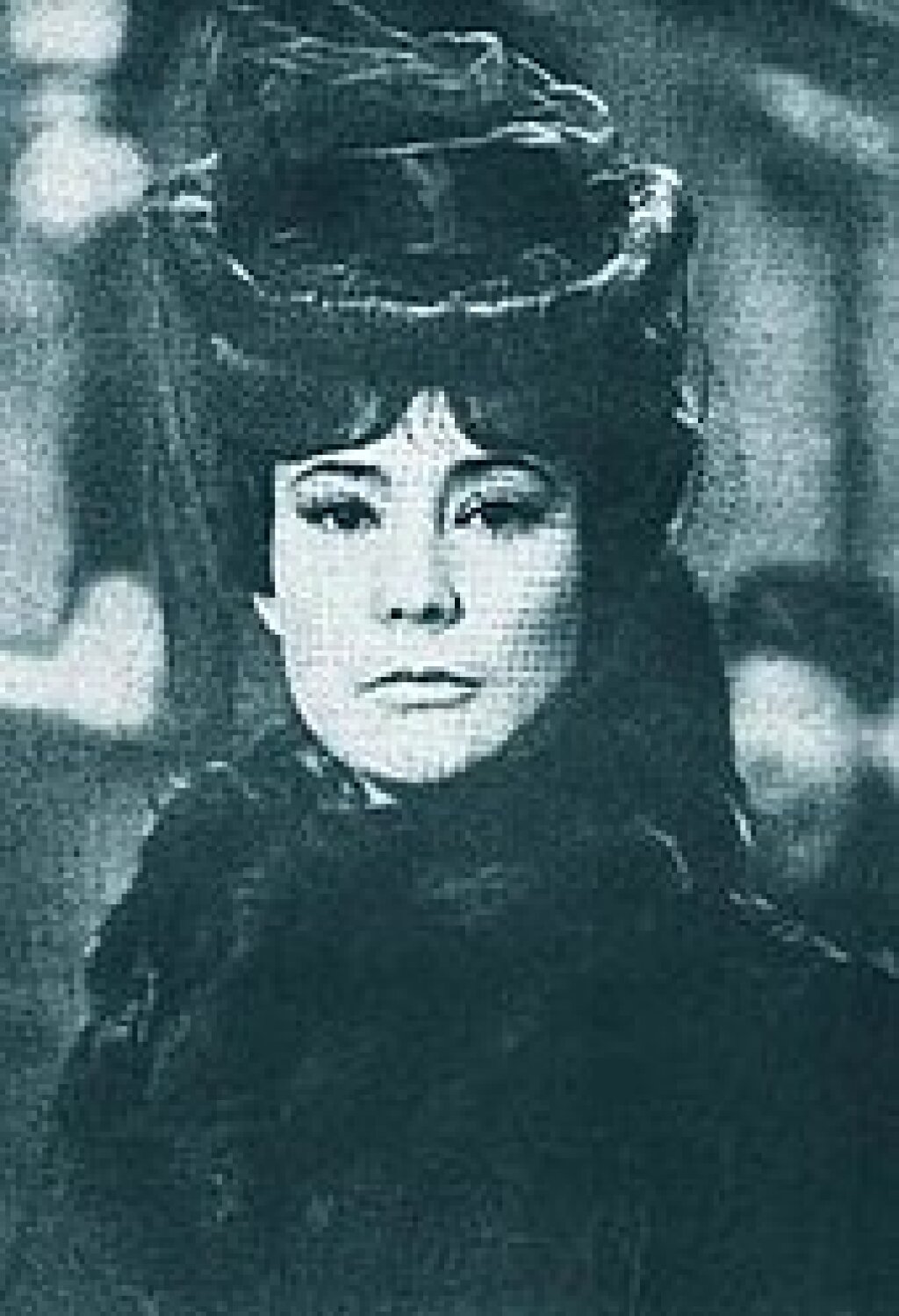Miriam Whiting is an Assistant Professor of Linguistics at Brigham Young University. Her interests include linguistic landscapes, discourse analysis, and language policy and planning.
This post is based on an article published in KinoKultura in April 2023.
On 15 August 2022, Russian President Vladimir Putin signed an order reinstating the Mother-Heroine [Mat’-geroinia] medal. The original award, conferred in the Soviet Union between 1944 and 1991, rewarded mothers of ten or more living children (children who had died in war or other service to the USSR also counted) with a medal and various privileges. Recipients of the new award will receive a medal and one million rubles, or about $10,500 dollars at present exchange rates.
This latest effort follows the Russian government’s other recent attempts to encourage population growth, including the advent of “maternal capital,” [materinskii kapital], a government financial incentive for families, the introduction of the Order of Parental Glory [Orden “Roditel’skaia slava”]messages from the Russian Orthodox church promoting childbirth and discouraging abortion; and posters like this one encouraging multi child families.
There is another, more informal source of messaging that reinforces the goal of these campaigns: television melodrama. The stories in many of the films produced after the 2007-2008 financial crisis were drastically different from those in pre-crisis films. Instead of the heroine ending up with a businessman in a Moscow high-rise, she now finds happiness in a humble apartment with a blue-collar or underpaid white-collar husband (a retired military officer or a policeman is even better) and a child or two, ideally with another on the way.
One example of this shift is the television film I am Happy [Ia schastlivaia], which premiered on Russia-1 on 19 September 2010. The word schastlivaia can mean either “happy” or “lucky,” but in this melodrama, the main character, Natalia, does not initially appear to be either. She lives with her three children and husband in a one-room apartment in a provincial town. When Natalia discovers she is pregnant with a fourth child, the doctor urges her to schedule an abortion. Natalia is shocked by the idea, but when she reveals her pregnancy to her husband, Sergei, he agrees with the doctor on the grounds that the couple must think about their other children. This disagreement leads to strife between Natalia and Sergei, who even consider divorce.
Natalia’s situation contrasts with that of her former schoolmate, Katrin, who is living with a wealthy husband in France and is so anxious not to have children that she is secretly taking birth control pills and bribing a doctor to tell her husband she has fertility problems. When she visits Natalia, Katrin is initially horrified by Natalia’s crowded and messy life and treats her to a makeover and other luxuries, giving Natalia a glimpse of what her life could be like without her large family and children. Ultimately, however, it is Katrin who realizes how empty her life is and returns to France eager to have a baby with her husband.
By the end of the film, an elderly relative with a large private home has invited Natalia and her family to move in with her, Sergei is working in a body shop and can provide for them, and they have welcomed a new child to the family. As they celebrate, Natalia receives a social media message with a picture from a very pregnant Katrin and the words “Thanks to you, I know what my purpose is.” Natalia’s willingness to stand up to social pressure has led to luck and happiness for both her and Katrin.
A second example of natalist messaging on recent Russian television is The Millionaire (Millioner), which premiered on International Women’s Day in 2012. It is based on a novel by a Russian author, but the plot resembles the 1946 American film It’s a Wonderful Life. Young architect Kirill is engaged to marry Vika, the daughter of a very wealthy man, but breaks off their engagement to marry a working girl, Lena. Several years later, he has not been as successful as he hoped, and is dissatisfied with his life with his wife and son.
One night, Kirill attends a class reunion where he sees Vika, who is clearly unhappy. She tells him that she is pregnant, but that she has scheduled an abortion for the next day. During his taxi ride home, Kirill wonders if breaking up with Vika was the wrong decision, and a magical cabbie offers him the chance to see what his life would have been like had he not done so. After a taxi accident, he wakes up married to Vika and living in a mansion.
At first, Kirill enjoys his new life, but then he discovers that everything is not what it seems: He and Vika are childless, and she is now sterile because he forced her to have an abortion, saying that they needed to live for themselves first. After enduring another accident, he wakes up in the hospital, back in his old life. After a joyful reunion with his wife and son, Kirill tells Lena that he wants them to have a daughter, and she seems to happily agree.
Kirill remembers what Vika told him at the reunion and calls her. She has not yet gone to the hospital, and he encourages her to keep the child, saying “It doesn’t matter who the father is. The important thing is that you become a mother…Just let him be, and you will be happy.”
Vika, who has been drinking heavily, raises the bottle to take another drink, but after a pause, pours the alcohol out the window, splashing her luxury car. She then throws the bottle aside and cradles her abdomen protectively. Not only has Kirill rediscovered what “really matters” in life, but the movie strongly suggests that, now that Vika will have her child, she, too, will be happy.
The television landscape has obviously changed since 2012. The few primetime hours on Russian television that are not filled with talking heads urging Russia to obliterate the West seem to currently belong to Soviet nostalgia, historical epics, and documentaries on espionage and the USSR. However, the melodramas I describe here are still often rerun during non-peak hours, continuing to promote Russian families not as they are, but as the government wishes them to be.




